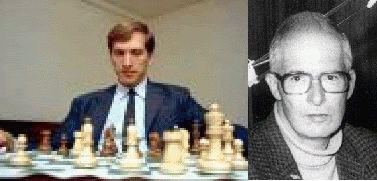Chess Column: Robert (Bobby) Fischer vs. Robert Byrne
 by Albert Frank
by Albert Frank

Robert (Bobby) Fischer, Robert Byrne
I'll present today a game that's considered to be one of the best chess games ever played. (There are about 20 games which could be considered as "the best" — this one has a particularity that we will see.) It was played at the 1963 — 1964 US Championship, between Grandmasters (GMs) Robert Byrne (with white) and Robert Fischer.
Robert E. Byrne (born April 20, 1928) is a leading player, who won the U.S. Championship in 1972. He is the chess columnist for the New York Times.
Robert Byrne and his younger brother Donald (who was also International Master and a member of the US team at some chess Olympiads) grew up in New York and were among the "Collins Kids," promising young players who benefited from the instruction and encouragement of John W. Collins.
Byrne became an International Master based on his results at the 1952 Chess Olympiad at Helsinki (silver medal on third board). In that same year he graduated from Yale University. He went on to become a professor of philosophy at the University of Indiana, and his academic career left him little time for chess.
In 1960, Byrne returned to serious play, winning the U.S. Open and taking a gold medal on third board at the Olympiad in Leipzig. In 1964, his third-place finish at the Buenos Aires tournament made him an International Grandmaster. By the late 1960s, he was playing chess professionally. He went on to other tournament successes, notably a third place at the Leningrad Interzonal in 1973, which made him only the third American (after Bobby Fischer and Pal Benko) to qualify for the Candidates tournament (part of the world chess championship process).
Since 1972, when he became the columnist for the Times, he has been less active as a player. He did, nevertheless, win tournaments at Torremolinos, Harare, and Lagos. He has also been a frequent contributor to Chess Life magazine, the publication of the United States Chess Federation (USCF). He has chaired USCF's committee on masters' affairs and been one of its vice presidents.
He was inducted into the Chess Hall of Fame in 1994..
Robert (Bobby) Fischer was born in Chicago, on March 9, 1943. His parents were divorced in 1945, and his mother moved him and his sister to Brooklyn, NY about a year later. The story goes that his sister bought him a chess set for his sixth birthday and soon he was consumed with the game. He was a very competitive child, a trait that only increased with age.
At the age of thirteen he beat International Master Donald Byrne (the brother of Robert) in what many have called the "Game of the Century". That game won the brilliancy prize for the year and put the name of Bobby Fischer on the lips of chess players from New York City to Los Angeles to Moscow at the tender age of 13. When he was fourteen he won the 1957 US Junior Championship and then won the open 1957 US Championship. Fischer became the youngest Grandmaster in the history of chess at age 15. On January 1, 1964, Bobby Fischer won the U.S. 1963 — 1964 Championship with a perfect score of 11 wins (usually, at this very high level, the winner scores around 70 to 75%, as did Kasparov in the Russia championship 2005). In 1971 at the age of 28 in his march to the World Championship match he dispatched, first Grandmaster Mark Taimanov and next Grandmaster Bent Larsen, both 6-0. Those matches coming on the heels of the Candidates Interzonal tournament in Palma De Mallorca finished off a string of twenty straight victories vs. Grandmasters, a display unprecedented in the annals of the modern championship. Former world champion Tigran Petrosian awaited him next. He gave Fischer more of a fight, posting one win and three draws before losing the match 6.5 — 2.5. Who'd be his next victim? That would be Boris Spassky, of course. Fischer won the match by a score of 12.5 — 8.5 and became World chess champion on August 31, 1972.
In 1975, he did not play a match against the new incredible talent Anatoly Karpov. (The top experts gave both an even chance to win this match. A few months before the foreseen match, ex World champion Max Euwe told me in Amsterdam "Karpov is so well prepared to play against Fischer that it is impossible to make any prognostication.) Karpov lost his title without playing.
Fischer also invented "Randomchess", in which the initial position of a game is randomly chosen (with a lot of constraints of course), with the idea of diminishing the preparation importance of the Grandmasters. It is to be noted here that the top computers (which have now reached a level very near that of the best players of the world) play as well at randomchess as normal chess.
A description of the game is provided in the following section.
Robert Byrne — Robert Fischer
1963 — 1964 US Championship
1. d4 Nf6 2. c4 g6 3. g3 c6 4. Bg2 d5 5. cxd5 cxd5 6. Nc3 Bg7 7.
e3 O-O
8. Nge2 Nc6 9. O-O b6 10. b3 Ba6 11. Ba3 Re8 12. Qd2 e5!!
Fischer isolates his d-pawn voluntarily. Pregame homework? Fischer's answer to Stewart Reuben in Chess: "Did we seriously think that he spent his time analyzing to death such arid variations for White?"
13. dxe5 Nxe5 14. Rfd1
At this point the grandmasters in the spectators gallery were giving the edge to Byrne due to the pressure on the half-open d-file and Fischer's isolated pawn there… But Fischer wrote in My 60 Memorable Games, "Add another to those melancholy case histories entitled 'the wrong Rook.'" The correct move is 14. Rad1!, leaving the King Rook to guard f2, though Fischer claims that 14. ... Qc8! will "keep the pressure."
Who could imagine that, in this quiet looking position, white's position is hopeless, and there is a mate coming in about 11 moves.
14....Nd3 15. Qc2 Nxf2
The attack starts, but … where is the attack?
GM Arthur Bisguier has said that he believes other famous positions would yield surprisingly speedy wins if we could but find "perfect" lines of play as Fischer does in this game.
16. Kxf2 Ng4+ 17. Kg1 Nxe3
18. Qd2 Nxg2
At this point the spectator's gallery radios back up to the playing hall — this move must be a mistake. To have any chance at all the conclusion is that Fischer must capture the rook.
19. Kxg2 d4 20. Nxd4 Bb7+ 21. Kf1
GMs in the pressroom were still arguing that White was winning.
Who should resign here? At this point tournament commentators GM Nicolas Rossolimo and IM James Sherwin believed that White had a won game. "Fischer has nothing at all for his piece," declared Rossolimo, one of the finest tacticians who ever lived, before a large audience. This is one of the particularities of this incredible game.
21…Qd7!!
And black resigned ( 0 - 1)
The confusion over the 18th move was still being cleared up in spectator gallery when the resignation was radioed down to a stunned hall. Even some GM thought Fischer had resigned.
What everyone except Fischer and Byrne missed was:
22. Qf2 (22. Ndb5 Qh3+ 23. Kg1 Bh6
and …Be3+) Qh3+ 23. Kg1 Re1+!!
24.Rxe1 Bxd4 and mate on g2.
This 21-move win against Robert Byrne, who had the nickname of "invincible" because of his super-solid play in those days, garnered the brilliancy prize. K. F. Kirby, the then editor of the South African Chess Quarterly, described his feelings about what many regard as the finest miniature in the long history of chess: "The Byrne game was quite fabulous, and I cannot call to mind anything to parallel it. After White's eleventh move I should adjudicate his position as slightly superior, and at worst completely safe. To turn this into a mating position in eleven more moves is more witchcraft than chess!" Yet Byrne's resignation in this game is arguably the best known element in the legend of this famed brilliancy.















2 comments:
A most incredible game indeed. Fischer's attack - and Byrne's resignation - seemed to come out of nowhere. When I replayed the game, I was at first totally puzzled why Byrne had resigned (in most games the reasons for resignation are more or less obvious). But let me point out that after 25. Ne4! there is no mate on g2. To be fair, after 25. ..Bxf2+ 26. Kxf2 Qxh2+, White still faces a horrible defeat, e.g. 27. Ke3 Re8 28. Kd3 Bxe4+ 29. Rxe4 Qxg3+, winning the e4 rook (30. Kd4? Rd8+ with even more disastrous consequences). So the soundness of Fischer's play is not in question: Black's positional advantage is overwhelming.
With his record, you have to say that Garry is the greatest, but Bobby is still my favourite. I enjoyed reading this, thank you. The typo ('black resigns') is somehow fitting in the context of the game cited. And the detail about Bobby's 'do you think I prepared to play against this rubbish?!' is new to me and adds to the value of that wonderful game.
Post a Comment